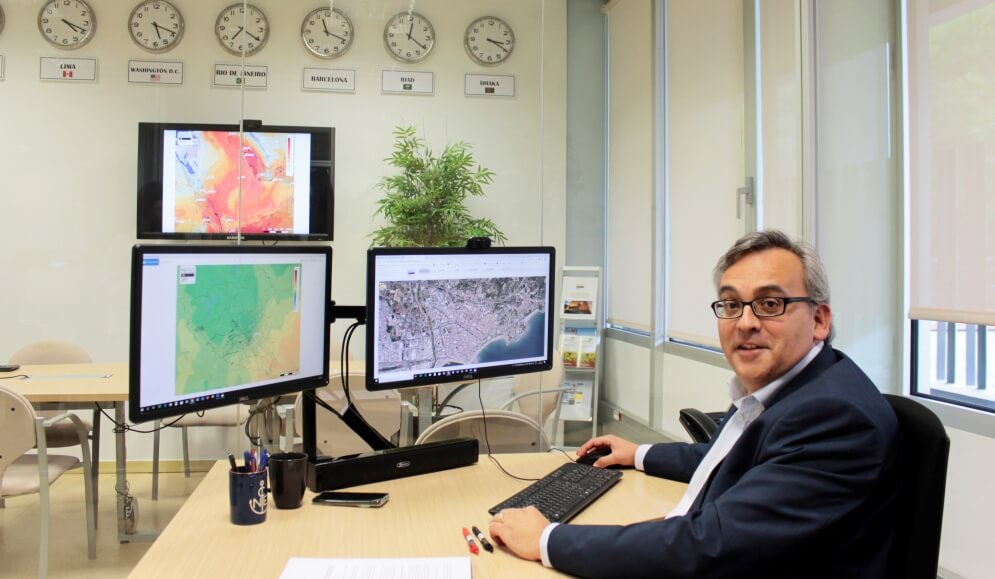
Meteosim implements the world’s first comprehensive air quality management system in Riyadh
Meteosim, headquartered in the Barcelona Science Park (PCB), has implemented a first-of-its-kind system in Riyadh to integrate, in a single platform, the city’s air quality forecast, atmospheric chemical emergency management and any related decision making. This is the world’s most ambitious project in this field allowing to predict the air quality in any given street in the capital city of Saudi Arabia, which has over 8 million inhabitants.
The project –which Meteosim has developed alongside Advisian, the environmental division of the world’s top engineering company Worley Parsons– combines the numerical modelling of time with big data (generated each day, with billions of pieces of data being analysed) to predict the air quality on any given streetof Riyadh.
According to Oriol de Tera, CEO of Meteosim, “This is the world’s most ambitious air quality project currently in operation. The platform has integrated each source of pollution in a desert city of 8 million people, accounting for its heavy traffic and the contribution of the area’s powerful oil & gas industry”.
The Riyadh system represents a logical step forwards for Meteosim, which is a global leader for meteorological services and air quality thanks to its use of the most advanced numerical modelling techniques. This technology allows the company to work with atmospheric information in different time horizons (past, present and future), opening an interesting range of possibilities for the adoption of preventive actions –as well as corrective and mitigating measures– that will improve the quality of air breathed by Riyadh’s citizens.
“Our Riyadh project is based on large city environmental management. Air quality is an issue on the agenda of every city across the world as it is known to be responsible for high healthcare costs and even the premature death of millions of inhabitants. Governments from around the world are concentrating their efforts on the promotion of smart cities. But what could be more “smart city” than an air quality management system that collects meteorological, traffic, public transport and healthcare data?”, asks Oriol de Tera.
In fact, a recent study published in the European Heart Journal claimed that there had been 8.8 million premature deaths worldwide that were related –either directly or indirectly– to air pollution, more than double the 4.2 million that had previously been estimated by the World Health Organisation (WHO).
Furthermore, reports such as that published by the World Bank have revealed that air pollution costs the global economy more than 5 trillion dollars per year for health and social care and 225 billion dollars for sick leave. Another study carried out by the Organisation for Economic Cooperation and Development (OECD) in 2016 estimated that, if the current situation fails to change, by 2060 these costs will rise to between 18 and 25 trillion dollars.
15 years at the cutting edge of the global market
With the development of the Riyadh project, Meteosim caps off 15 years of successful progress since the company’s inauguration in 2003 as a spin-off from the alliance between researchers from the University of Barcelona’s Department of Astronomy and Meteorology and the American company Meso Inc.
Meteosim’s initial focus was on the renewable energies market, creating the Meteosim Truewind joint venture in 2007 alongside the American company AWS Truepower. Since then, Meteosim has channelled its efforts into other areas, providing services to several sectors impacted by meteorology.
Currently, with offices in Barcelona, Washington DC and Bogotá, the company provides custom-made meteorological forecast, air quality, emergency management and climate change consultation services to public entities and to the chemical, energy, oil & gas and port industries.
Having completed over 700 projects in 30 countries around the world, 60% of Meteosim’s turnover comes from countries other than Spain.
“Our clients value the system’s reliability. By integrating it into their production operations, they are able to gauge the impact their activity will have on air quality 48 hours in advance and are able to quickly and effectively manage any accidental emission into the atmosphere, thereby avoiding problems and sanctions. We work with numerical time prediction models, but we aren’t ‘time people’; our aim is for meteorology to have a positive impact on our clients’ results”, explains Oriol de Tera.
Meteosim turned over 1.5 million euros in 2018, generating a net profit of 300,000 euros. The company’s growth plans are now focused on consolidating the Latin American market and growing in Europe and the Middle East, aiming to turn over €3 million in 2021. As Oriol de Tera states, “Our business is global, and we need to continue growing sustainably in the international market”.




